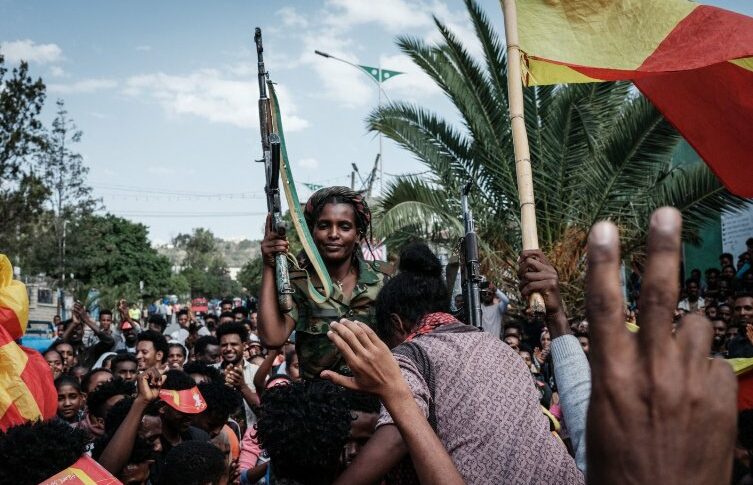Africa
Ethiopian PM: “Foreign interference” hindering Tigray peace talks

TPLF fighters celebrate their return to Mekele, capitalof Tigray region, on June 29, 2021 AFP photo1
By Tesfa-Alem Tekle
November 1, 2022 (NAIROBI) – Ethiopia’s Prime Minister Abiy Ahmed says there is “heavy foreign interference” in the ongoing peace talks between the government and leaders of the country’s embattled Tigray region.
Speaking to the China Global Television Network (CGTN), Abiy said Ethiopians can solve their own matters, despite international pressure for a ceasefire.
“Of course, if there are lots of interventions from left and right, it’s very difficult,” Abiy said, hinting the alleged interference was hindering the peace talks.
He added, “Ethiopians should realize that we can solve our own problems by ourselves.”
Abiy further hoped a peace agreement would be reached despite foreign interference in the ongoing talks.
The Africa Union brokered peace talks aimed to bring an end to Africa’s deadliest conflict, being held in South Africa.
The first formal meeting between the federal government and Tigray region’s ruling party, the Tigray People’s Liberation Front (TPLF) began on Tuesday, October 25 in Pretoria.
However, not much information is filtering out of the venue, mainly on the content and possible progress of the talks.
First round extended
The talks have continued this week, although the first round of talks was initially supposed to end on Sunday.
A spokeswoman for the African Union Commission Chairperson Moussa Faki Mahamat on Monday said “there was no date limitation” on the talks.
A diplomatic source on Tuesday told Sudan Tribune that negotiations between the warring parties continued on Tuesday, two days after the first round of talks were supposed to conclude.
According to the source, the talks might continue till Wednesday or beyond.
“The meetings will continue on Wednesday or so. The talks are being pushed by a few days to allow the parties to narrow their differences within the extended period of time” the source who asked for anonymity told Sudan Tribune.
Major Goals of Talks
According to the diplomatic source, the major goal of the ongoing first round of talks is for the parties to agree on a cessation of hostilities, unfettered humanitarian access to the war-torn Tigray region and withdrawal of Eritrean forces.
As conditions for peace, the Tigray rebels have previously demanded the restoration of basic services such as access to telephone, electricity, internet and banking services in the region, unrestricted aid access, and the withdrawal of Eritrean forces.
Disarm TPLF
After Pretoria talks start, federal officials on their side are requesting the disarmament of TPLF.
This fresh condition by the government could end the talks without any breakthrough, according to political analysts.
Since the talks began, fighting has raged in Tigray, where government troops have been advancing since mid-October, supported by the Eritrean army and forces and militias from the neighbouring Amhara and Afar regions.
The ongoing peace talks are facilitated by AU envoy and Nigeria’s former president Olusegun Obasanjo and supported by former South African Deputy President Phumzile Mlambo-Ngcuka and former Kenyan President Uhuru Kenyatta.
The US government is supporting the peace process through its Horn of Africa envoy, Mike Hammer, who flew with Tigray’s mediators to South Africa in a US military plane.
The two-year conflict has killed tens and thousands, uprooted millions and subjected 90 per cent of the estimated seven million Tigray population to be aid-dependent.
“As many as half a million” people have been killed in the conflict, according to Linda Thomas-Greenfield, the US ambassador to the United Nations, who warned the UN Security Council last month of the potential for “mass atrocities” if the fighting continues.
(ST)
